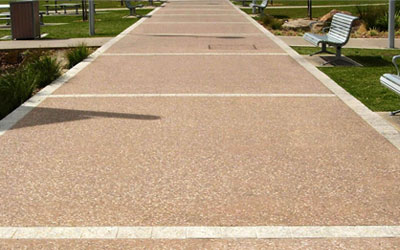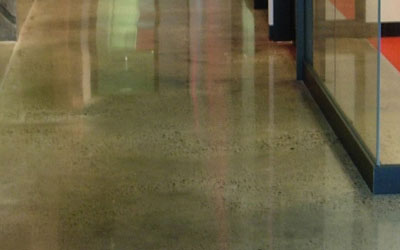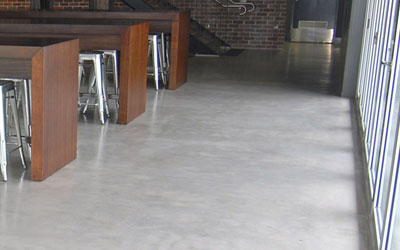Polished concrete floors are durable, low maintenance, seamless, hygienic and environmentally friendly. However, there are variations in initial cost, treatment, durability and lifespan, depending on the type of polished concrete floor you choose to have.
At Honestone, we offer you various innovative polished concrete systems to suit your preferences in appearance, maintenance and longevity.
The Standard Service
 Our standard ‘grind and seal’ service is the method of grinding a concrete floor to the desired aggregate exposure (or more often, no aggregate is exposed), then applying a clear resin top coat. Resin sealers come as water or solvent-based acrylic, polyurethane or epoxy and are available in matte, satin or gloss finish.
Our standard ‘grind and seal’ service is the method of grinding a concrete floor to the desired aggregate exposure (or more often, no aggregate is exposed), then applying a clear resin top coat. Resin sealers come as water or solvent-based acrylic, polyurethane or epoxy and are available in matte, satin or gloss finish.
Whilst the resulting polished concrete floors will be smooth and flat, any holes, cracks and imperfections will be noticeable.
For external polished concrete or ‘honed’ concrete, we utilise the same grinding methods. However, to maintain a certified slip-resistant surface we use an impregnating sealer to provide stain protection.
The Deluxe Service
 Honestone’s deluxe ‘grind and seal’ service is a further refinement of our standard system. It involves grouting the floor to minimise any holes or cracks. Various first-quality resin sealers are then used to provide a barrier that protects the concrete from food and chemical penetration.
Honestone’s deluxe ‘grind and seal’ service is a further refinement of our standard system. It involves grouting the floor to minimise any holes or cracks. Various first-quality resin sealers are then used to provide a barrier that protects the concrete from food and chemical penetration.
The Premium Service
 Honestone’s premium diamond polished concrete is the ultimate in concrete floor refinement and among the best you will find on the market.
Honestone’s premium diamond polished concrete is the ultimate in concrete floor refinement and among the best you will find on the market.
To achieve this premium polished concrete, we treat the concrete floor with deep-penetrating densifiers that react with the material to make its surface harder, stronger and far more resistant to abrasion. Our experienced operators then create matte, satin or high gloss levels by diamond polishing the treated surface.
If you are considering a premium concrete floor of this type, it is important that you speak to us at Honestone during the earliest stages of your project, as there will be particular placement guidelines you must follow that are crucial to achieving your preferred finish.
Polished concrete selection made easy
Step 1
If possible, for new floors select concrete colour and aggregate.
Step 2
Type of aggregate exposure eg. cream polish (no exposure), salt and pepper, hit & miss or fully exposed.
Step 3
Level of finish eg. which resin top coat, or premium polished in matt, satin or gloss.
You may want to change the color of your existing concrete floor, or require a thin polished concrete topping? Discover Pangaea »
Polished Concrete FAQ
Can you polish an existing concrete slab?
Yes! If you want a fresh, cutting-edge look, Honestone can polish your existing slab and create a new, contemporary and low-maintenance floor. The overall look will depend upon the type of concrete and hardness (MPA) of the slab, the aggregate and the condition of the slab.
Is a polished concrete floor slippery?
Not necessarily, the surface can be made non-slip. This will depend on the method of grinding and sealers used. Honestone has the expertise in creating such surfaces for public areas, such as walkways, parkways and communal recreational spaces.
Can I choose the aggregate for a new concrete slab?
Yes! If you are laying a new concrete slab, you will be able to select a cement colour combined with various aggregates to your liking. You will need to discuss these options with your supplier.
Is there an alternative to the exposed aggregate look?
Yes! The depth of the grind can give different levels of aggregate exposure in the final finish. A non-exposed aggregate finish can be achieved. However, the surface needs to be in excellent condition.
Can I colour my polished concrete floor?
Yes! If you are laying a new slab, there are different cement colours to choose from, which you will need to discuss with your concrete supplier.
What is the function of a sealer?
Sealers prevent staining of the surface and assist with cleaning. Sealers can also help enhance the colour of the polished concrete floors’ finish.
What is the grinding process?
Diamond grinding or honing is the process of removing the surface layer of concrete. This can be done to a level that leaves the aggregate exposed while having a smooth, matte, low-maintenance finish, or without exposing the aggregate at all.
Grinding marks will often be visible, resulting in the need for using progressively finer grinding pads. Depending on the aggregate and level of grinding the concrete, a polished finish or high lustre can be achieved with this process.
Is there much dust when you grind and polish a slab?
Our machines have a dustless vacuum system. Dust is kept to a bare minimum. However, due to the nature of this work, minimal dust will always be there.
How much does polished concrete cost?
The price varies according to the condition of the slab, the size of the area, the level of grinding required, the aggregate exposure and the sealer. Polished concrete is a cost-effective alternative, comparable to timber, tiles, carpet, vinyl, pavers, stencilcrete (stenciled concrete), etc. Prices to suit your particular project are available on enquiry.
When should I liaise with a concrete polisher?
At the very earliest planning stage is best, so we can provide you with cost effective solutions.
At what stage should concrete floor polishing commence?
Preferably, the first cut should be done just before the frame goes up. This way, we can get right up to the edges. We then do a final cut and polish after the walls are complete but not yet painted. The concrete will need to be covered during the building process to prevent staining from other trades.
How regularly do the floors need to be maintained?
This depends on the amount of traffic on the floors. In a residence, with the right combination of sealers, your floors may need resealing and rebuffing in 5 to 10 years. In a commercial environment (such as restaurants), we recommend the floors be resealed and rebuffed every 12 months. We offer this service at a minimal cost.
How long will concrete floor polishing take?
There are many factors that will impact the time frame. These are the condition of the slab, the finish required, accessibility of the area, preparation of the slab, and the number of men and machines available. Honestone is experienced in delivering projects under tight schedule and we have completed small projects in two days and large scale (9000sqm) commercial jobs in six weeks.










